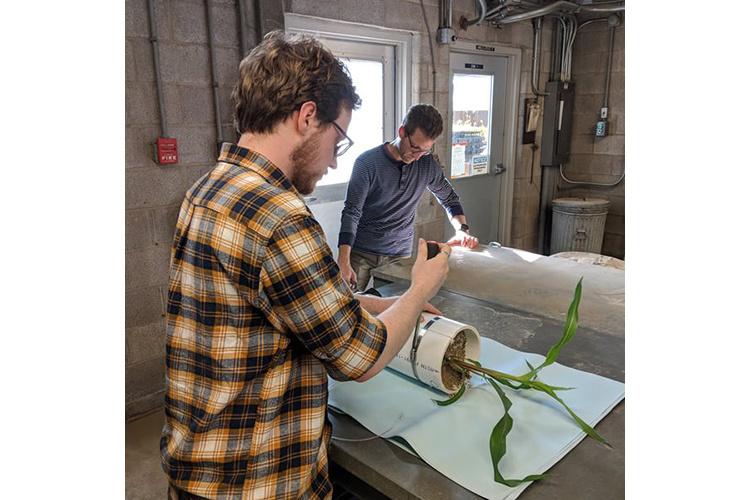UK researchers working with Salk Institute to develop more resilient plants
UK researchers working with Salk Institute to develop more resilient plants

Deeper and more dense root systems could have many benefits for crop producers across the United States and for the environment, including improved soil quality and plants more capable of mitigating and withstanding the effects of climate change. University of Kentucky soil scientists are leading a project with researchers at the Salk Institute for Biological Studies to find ways to create more vibrant and robust plant root systems.
“Enhanced root systems could help store more carbon in the soil and increase soil organic matter, which makes the soil healthier and could increase yields,” said Hanna Poffenbarger, assistant professor in the UK College of Agriculture, Food and Environment.
Poffenbarger, UK soil scientist David McNear and UK graduate student Brian Rinehart are studying the root systems of wheat, corn, rice and soybeans. They are collaborating with Joanne Chory and Wolfgang Busch, co-directors of the Salk Institute’s Harnessing Plants Initiative, and Asmeret Asefaw Berhe, professor at University of California, Merced and nominee for the director of the U.S. Department of Energy’s Office of Science. The primary goal of the Harnessing Plants Initiative is to help mitigate climate change by optimizing plants to capture excess carbon dioxide from the atmosphere and store it deep in root systems.
The researchers are looking for varieties of each crop that have deeper roots, more root biomass and larger amounts of suberin, a waxy compound in plant roots that stores carbon and is thought to build soil organic matter.
“We want to better understand how suberin decomposes and contributes to soil organic matter,” Poffenbarger said. “We know that roots are very good at building soil organic matter, but we do not fully understand the role of suberin and other root traits.”
The project is funded by the Salk Institute for Biological Studies’ Harnessing Plants Initiative. Researchers will use Fourier transform infrared spectroscopy, a scientific tool that will quickly and precisely identify root tissue variations in cultivars. They will then study the decomposition of cultivars with the most differences to see which ones stabilize the most carbon. The decomposition study will be done first in the lab and then progress to the field.
This project is related to concurrent U.S. Department of Agriculture-funded research by Poffenbarger and McNear that explores how corn roots decompose and build soil organic matter.
The UK material is based upon work that is supported by the National Institute of Food and Agriculture, U.S. Department of Agriculture, under award number 2019-67019-29401. Any opinions, findings, conclusions or recommendations expressed in this publication are those of the author(s) and do not necessarily reflect the view of the Department of Agriculture.
Extension Plant & Soil Sciences Research Weather

